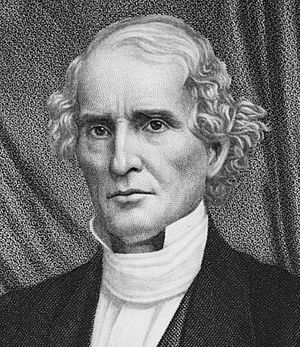Albert Barnes (theologian) facts for kids
Quick facts for kids
Albert Barnes
|
|
|---|---|

Engraving of Barnes by George E. Perine
|
|
| Born | December 1, 1798 |
| Died | December 24, 1870 (aged 72) |
| Occupation | theologian, author |
Albert Barnes (December 1, 1798 – December 24, 1870) was an important American religious leader, writer, and a strong supporter of ending slavery. He was a theologian (someone who studies religion), a clergyman (a religious minister), and an abolitionist (someone who wanted to end slavery). Barnes also supported the temperance movement, which encouraged people to drink less alcohol. He is most famous for his many books explaining the Old and New Testaments of the Bible. These books were published in 14 volumes during the 1830s.
Contents
Albert Barnes's Life Story
Albert Barnes was born in Rome, New York. He went to Hamilton College in Clinton, New York, and finished his studies there in 1820. Later, he studied at Princeton Theological Seminary, graduating in 1823.
Becoming a Minister
In 1825, Barnes was ordained as a Presbyterian minister. This means he was officially recognized to lead religious services. He first served as a pastor in Morristown, New Jersey, from 1825 to 1830. After that, he became the pastor of the First Presbyterian Church of Philadelphia, where he served for many years until 1868.
His Role in Church Debates
Albert Barnes was a key figure in a major debate within the Presbyterian Church, known as the Old School-New School Controversy. This was a disagreement between two groups: the "Old School" who wanted to stick to very traditional ways, and the "New School" who were more open to new ideas and changes. Barnes was part of the "New School" group.
In 1836, Barnes faced a trial for heresy. Heresy means having beliefs that go against accepted church teachings. The trial was mainly about his views on certain religious ideas, like the idea of "original sin" (the belief that all humans are born with sin because of Adam's actions). Even though he was not found guilty, this trial caused a lot of tension and helped widen the gap between the two groups in the church.
His Influence and Writings
Barnes was known as a powerful speaker. However, his biggest impact came from his books that explained the Bible. These books were incredibly popular, both in America and Europe. By 1870, over a million copies of his Notes on the New Testament had been sold! He also wrote popular notes on other parts of the Bible, like Job, Psalms, Isaiah, and Daniel.
The reason his books were so popular was that he made complex Biblical criticism (the study of the Bible's history and meaning) easy for everyone to understand. Barnes also wrote other important books, including Scriptural Views of Slavery (1846) and The Way of Salvation (1863).
Fighting Against Slavery
Albert Barnes was a strong abolitionist. He believed that slavery was wrong and immoral. In his book The Church and Slavery (1857), he argued that churches should speak out against slavery just like they speak out against other sins.
Famous abolitionist Frederick Douglass even quoted Barnes in his powerful 1852 speech, "What to the Slave Is the Fourth of July?" Douglass quoted Barnes saying, "There is no power out of the church that could sustain slavery an hour, if it were not sustained in it." This showed Barnes's belief that if churches truly opposed slavery, it would quickly end.
Later Life and Leadership
In 1855, Barnes was chosen to be a member of the American Philosophical Society, a famous group that promotes knowledge. While he was the pastor at the First Presbyterian Church of Philadelphia, he also became the President of the Pennsylvania Bible Society in 1858. He held this position until he passed away in 1870. He retired from his role as pastor in 1868 and was given the special title of Pastor Emeritus.
Albert Barnes's Passing
Albert Barnes died in Philadelphia on December 24, 1870. He was 72 years old. His death was sudden and unexpected. His wife wrote that he seemed healthy and full of energy. On the day he died, he spent the morning in the city, had dinner, and then went for a walk with his daughter to visit friends. He spoke for a few minutes, then suddenly passed away peacefully.
Where to Find His Works
The Presbyterian Historical Society in Philadelphia, Pennsylvania, keeps many of Barnes's original writings, notes, sermons, and lectures. The Burke Library Archives at the Union Theological Seminary in New York City, New York, also has a collection of his sermons.
Images for kids
 | Kyle Baker |
 | Joseph Yoakum |
 | Laura Wheeler Waring |
 | Henry Ossawa Tanner |


